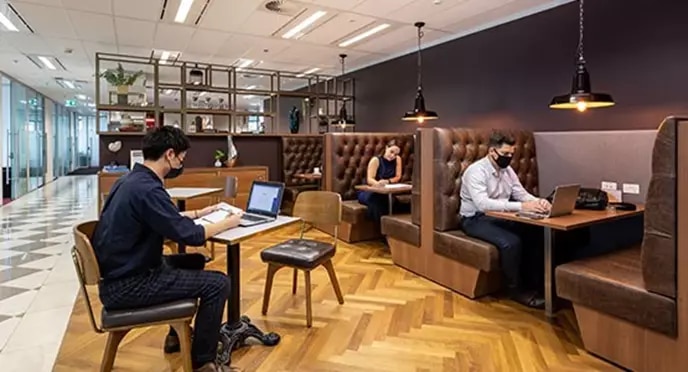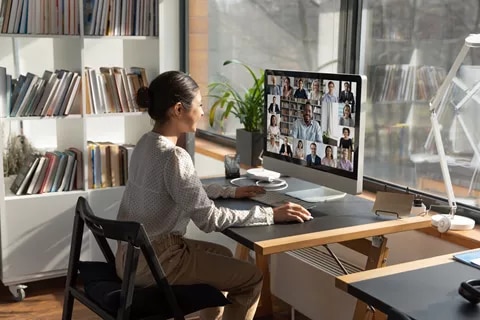How Much Office Space Do I Need Per Employee?
By Paige Tonna

One of the most detrimental aspects of starting a business is that they can cost a fortune, and when it comes to the leasing of space, making a bad decision and underestimating how much space is needed can lead to unnecessary and expensive expenditures. Often commercial property and office space is one of the biggest costs for a business, and business owners are left with the question, “How much office space do I actually need?”
Why Office Space Per Employee Matters
For many employees, the perfect office space is key to increasing their productivity levels and overall work performance.
In the last two decades, trends in office space design have dramatically shifted from desks being separated by walls or cubicles to open-plan workspaces with more flexible office space. There are fewer private offices and more collaborative breakout spaces, usually accompanied by extra square footage than the offices of the past. This trend emerged in response to overall findings that these ergonomic styles of offices correlated to greater employee and business outcomes.
In 2015, a groundbreaking study published in the Journal of Environmental Psychology found that teams working with little desk space and few communal areas were associated with increased stress and reduced cognitive function. This in turn, proved to be detrimental to their productivity and focus levels, reducing their overall performance.
But it’s not just their engagement levels that benefited from these changing office designs. Employees’ long-term health and well-being significantly improve when their offices have a combination of extra square footage, natural light, quiet rooms, and flexible space. This ultimately means that the question ‘how much square footage does my business need’ is one of the most important ones for thought.
How Much Office Space Do I Need Per Employee?
UK standards suggest an average of 11 cubic meters, or 5 square meters, as the minimum space required per person in an office, but this is just a guide. To determine how much space a business needs, we need to look at things like how much work employees produce, the size of the company and more, including:
- Number of staff including remote workers
- Potential company growth
- Ceiling height
- Furniture and equipment considerations such as the amount of space these will take up
- Overall lower cost of doing business
- Office layout
- Other space considerations such as meeting and lunchrooms
Even though there's no specific square footage established for the areas mentioned above, most office-based businesses have 1 meeting room for every 10 employees. Add to that, reception areas usually take up 100 square feet (9 square metres) per person and break rooms and storage (filing) areas take up 75 square feet (7 square metres) and 200 square feet (20 square meters) on average respectively.
Looking For a Workspace?
Top Factors that Affect Office Space Requirements
Rent and Price Per Square Foot
Rental costs and price per square footage play a significant role in determining the amount of office space a company chooses. Businesses often face a trade-off between:
- Optimising employee well-being and productivity
- Minimising overhead costs
This creates a balancing act for businesses. Finding the right amount of space involves considering factors like industry standards, employee needs, and business priorities while navigating the financial constraints imposed by rent and price per square footage.
The location also affects the price per square foot. For example, in London, the average rent per square foot is as low as £20-30 per square foot in less central locations to over £145 per square foot in prime real estate.
Hybrid Working Policies
Remote work is here to stay. With more employees working fully remote or hybrid between the office and home than ever, companies will need to consider how much office space they allocate for these workers.
Do we need more desk space for workers who come in only occasionally or just once a week? Will these workers enjoy being in close proximity to their coworkers when they are in the office?
These are the questions companies need to ask themselves when reflecting on their ideal office space.
Future Growth
Although it may be cost-effective to rent just the space your company currently needs, it’s important to consider your overall growth plans and any potential new hires you may acquire in the short and long term.
A comfortable and well-designed workspace with plenty of room can be an attractive perk for attracting and retaining top talent too, making it another crucial factor for companies to consider.
Renting Too Much or Too Little Office Space
Leasing too much space puts you at risk of paying for areas which could potentially be empty. Office wastage refers to costs being paid unnecessarily on rent, business rates, service charges, utilities and more. Having too many desks which are unused can also have an impact on employee motivation and their perception of the business. If you have clients in the office, too much empty space doesn’t necessarily create the right impression of a successful business. We’ve seen empty walls show empty rooms, empty desks show little work is being done, and empty space around empty plants show no life in your office.
On the other hand, renting too little space can limit business growth and hinder staff expansion. Fitting out new space to accommodate new people or relocating prior to lease expiration can be costly and can lead to higher office costs due to the size of the property.
How Large is the Average Office Space
In the UK, the general rule is that businesses should allow an average of 110 square feet of total office space per employee. This has slightly increased from the 100 square feet average that most businesses considered prior to 2020.
How To Plan Your Office Space
When planning your future office space, you need to consider your business requirements. These include:
Understand your organisational strategy
Consider what your office space says about you and your company. Don't underestimate the importance of a good first impression; it's part of the branding process. From the moment you walk into your space, there should be a mix of space and energy that will put employees and customers at ease and make them feel like they're in the right place. A well-maintained and well-equipped office space with an open floor plan can create a positive impression on clients and partners.
Even a small business's office space should be an environment that makes your team comfortable and proud to work in.
Business objectives
You need an office space that supports your business objectives. Some companies prioritise spacious, amenity-rich environments, while others focus on maximising efficiency through smaller, multi-functional spaces. That could include reducing costs, fostering greater collaboration between teams, or improving productivity. You may also be looking to create a desirable office space to attract and retain top talent.
Future needs
When you rent office space, don't just sign up for a long-term lease- have a conversation with your landlord about flexible options! Are your teams growing or shrinking? Will more employees be working remotely in the future? Do you plan to maintain remote and hybrid working policies or will you expect all employees to return to the office 5 days a week at some point?
It’s important to think carefully about where your business is heading in the next few years and discuss any flexible options available, such as coworking or serviced office spaces that have flexible contracts and renting terms and are a cost-efficient alternative to traditional offices.
Type of layout required
The space you need will depend on what type of business you are in and what type of work you do. Do you need to provide private offices and spaces? How many meeting rooms and common areas do you need? Do you need space for physical storage or for a growing team? The needs also vary by industry. For example, an office space for marketing agencies may be different to those in the law sector.
All of these questions should help business leaders with their floor plan’s space allocation.
What types of spaces are required for different employees?
Some employees may benefit from open spaces that allow easy collaboration and communication between team members, while others may need more private spaces for meetings and phone calls. Employees working in creative departments might prefer to work in several different spaces rather than the one allocated desk, while those in the legal or finance industries may require cubicles or personal desks for private phone calls and meetings.
Cost
Thriving in the office is essential. Balancing the costs of renting an office space with employee needs is also essential. If you want to be able to thrive in the office, provide your team with an office space where they can put their best foot forward. Of course, the best office space would be one that provides your team with the ability to perform to a high standard.
Whilst a smaller office with a rental price to match it may be great for your budget, it may cost more in the long run through lower employee productivity, morale and run the potential risk of losing top performers.
Additionally, an office space that has the right balance between the amount of value and the size of the office can be attractive to both your team and outside talent. The amenities in the building are also important to consider, as well as how much maintenance these facilities will cost.
Finding the Right Office Space for You and Your Employees
With all things considered; the minimum amount of office space needed in the UK will range from 150 to 300 square feet per person (14 to 28 square metres per person). Having all this information clear in your mind will improve your office space planning and help you make the best decision for your business. To discover a whole world of serviced offices, including locations, prices, facilities and more, visit us at Servcorp.
Contact Us
If you’ve got any questions call us +44 203 059 7800 or fill in your information below and we’ll get back to you shortly.





